Biosphere | Geography - Terrestrial biomes | 9th Social Science : Geography: Biosphere
Chapter: 9th Social Science : Geography: Biosphere
Terrestrial biomes
BIOMES
A biome is a
geographically extensive ecosystem where all flora and fauna are found
collectively. It is the total assemblage of plant and animal life interacting
within the biosphere. Biomes are defined by abiotic factors like, relief,
climate, soils and vegetation. They are classified into two broad categories, terrestrial
biomes and aquatic biomes.
TERRESTRIAL BIOMES
Terrestrial biomes is a
group of living organisms that live and interact with one another on land. They
are mainly determined by temperature and rainfall. Some of the major
terrestrial biomes of the world are
A. Tropical Forest
Biomes
B. Tropical Savanna
Biomes
C. Desert Biomes
D. Temperate Grassland
Biomes
E. Tundra Biomes
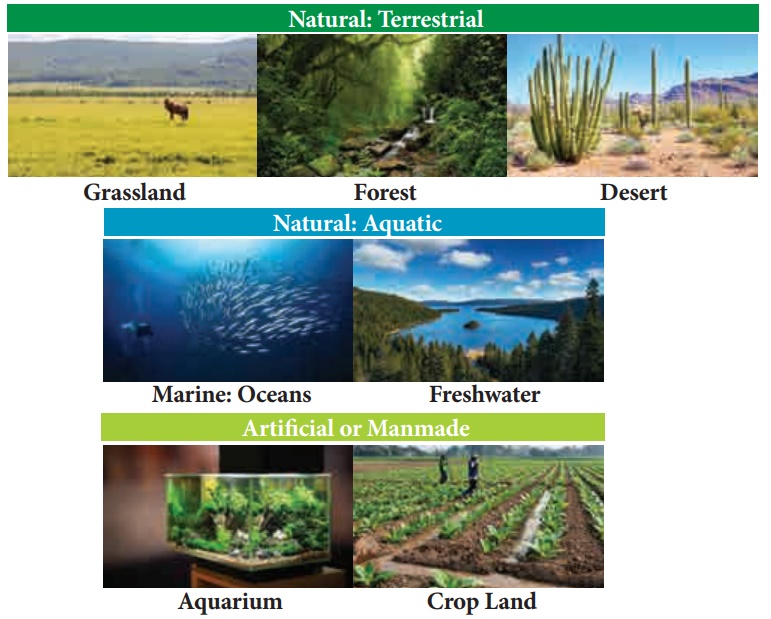
A. Tropical Forest Biomes



The tropical forest
biome is comprised of several sub-biomes, including evergreen rainforest,
seasonal deciduous forest etc.
This biome extends
between 10° N and 10° S of the Equator. Central and South America possess half
of the world’s tropical forests. The climate in these biomes shows little
seasonal variation with high annual rainfall and relatively constant, high
temperature. This unique weather condition favours thick vegetative cover.
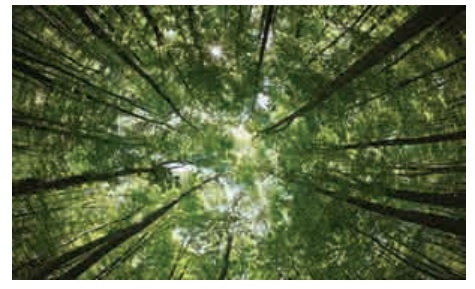
Tropical forests have
the highest biodiversity and primary productivity of any of the terrestrial
biomes. The Amazon basin, Congo basin and Indonesian islands are the major
regions of this biome. These regions have very dense forests and so have great
economic importance. Human settlements are found scattered here. They sustain
their livelihood through food gathering, fishing, lumbering and shifting
cultivation. Due to the humid nature of this biome, the people get afflicted to
tropical diseases like malaria, yellow fever etc. The chief trees found here
are rubber, bamboo, ebony, etc. Bats, pheasants, jaguars, elephants, monkeys
etc. are the important birds and animals found here.
B. Tropical Savanna (Grasslands) Biomes
Tropical grasslands are
generally found between tropical forests and deserts. Tropical Savanna biomes
are found between 10o to 20o N and S latitudes. These grasslands are generally
flat and are found in the Sahel, south of Sahara in East Africa and in
Australia. This biome is generally hot and dry and experiences moderate to low
rainfall. So, the grass which grow here are tall and sharp. Hence the chief
occupation of the people found here is herding. The primitive people living
here are nomadic.
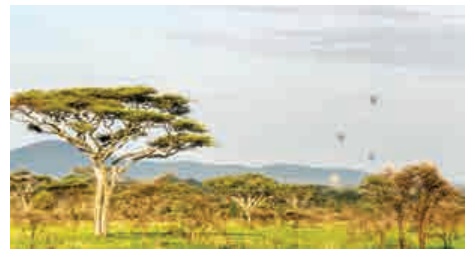
The common animals found
here are the lion, leopard, tiger, deer, zebra, giraffe etc. Flora such as
Rhodes grass, red oats grass, lemon grass etc. are found in this biome.
C. Desert Biomes
Deserts are usually
found on the western margins of the continents between 20° and 30° N and S
latitudes. The annual rainfall is less than 25 cm in these regions. Due to the
lack of rainfall and arid conditions, these regions do not possess any
vegetation but have special vegetation type called Xerophytes. As the soil is
sandy and saline, deserts remain agriculturally unproductive. Drought resistant
thorny scrubs and bushes, palms are found here.
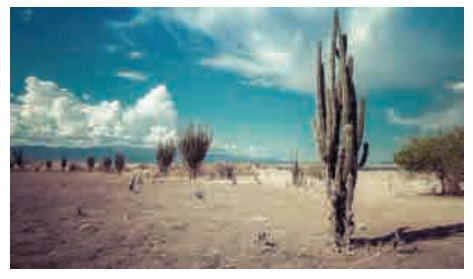
Tribal people who live
here practice food gathering and hunting. They move their temporary settlements
frequently in search of pastures. Transportation becomes very difficult here
and is carried on by camels. Reptiles like snakes, lizards, scorpions etc., are
most commonly found here.
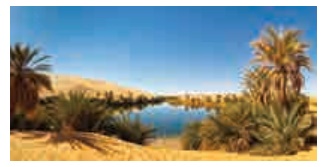
D. Temperate Grassland Biomes
Temperate Grasslands are usually found in the interior of the continents and are characterized by large seasonal temperature variations, with warm summer and cold winter.

The type of grassland in these
regions strongly depends upon precipitation. Higher precipitation leads to tall
and soft grass and lower precipitation leads to short and soft grass. These
regions favour wheat cultivation. Extensive mechanised agriculture is practised
due to lack of farm labour. Pastoral industry becomes the main occupation,
thereby facilitating slaughtering of animals, packing of raw and processed
meat, dairy products etc. The common birds and animals are grass hopper,
wolf, bison, prairie dog etc.
E. Tundra Biomes
These vast lowlands are
found where the ground remains frozen. Greenland, Arctic and Antarctic regions
and Northern parts of Asia, Canada and Europe fall in this biome. These regions
are also called Barren lands. This biome experiences long severe winter
and short cool summer. Due to the prevailing of low temperature and short
growing seasons, the net primary productivity is very low in tundra. People are
nomadic. Hunting and fishing are their major occupations. The population here
is extremely sparse and the harsh environment makes them change their
settlement frequently.
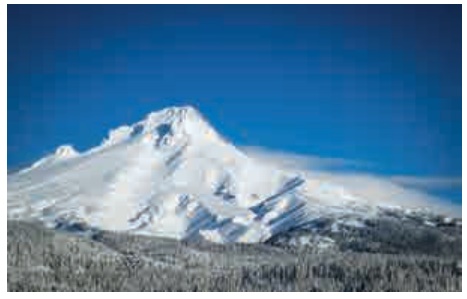
They live in igloos in
winter and in tents during summer. Arctic moss, Arctic willow, lichens etc.
grow here. Fauna like the polar bear, wolverine, reindeer, snowy owl are found
here.![]()
![]()
![]()
![]()
Related Topics